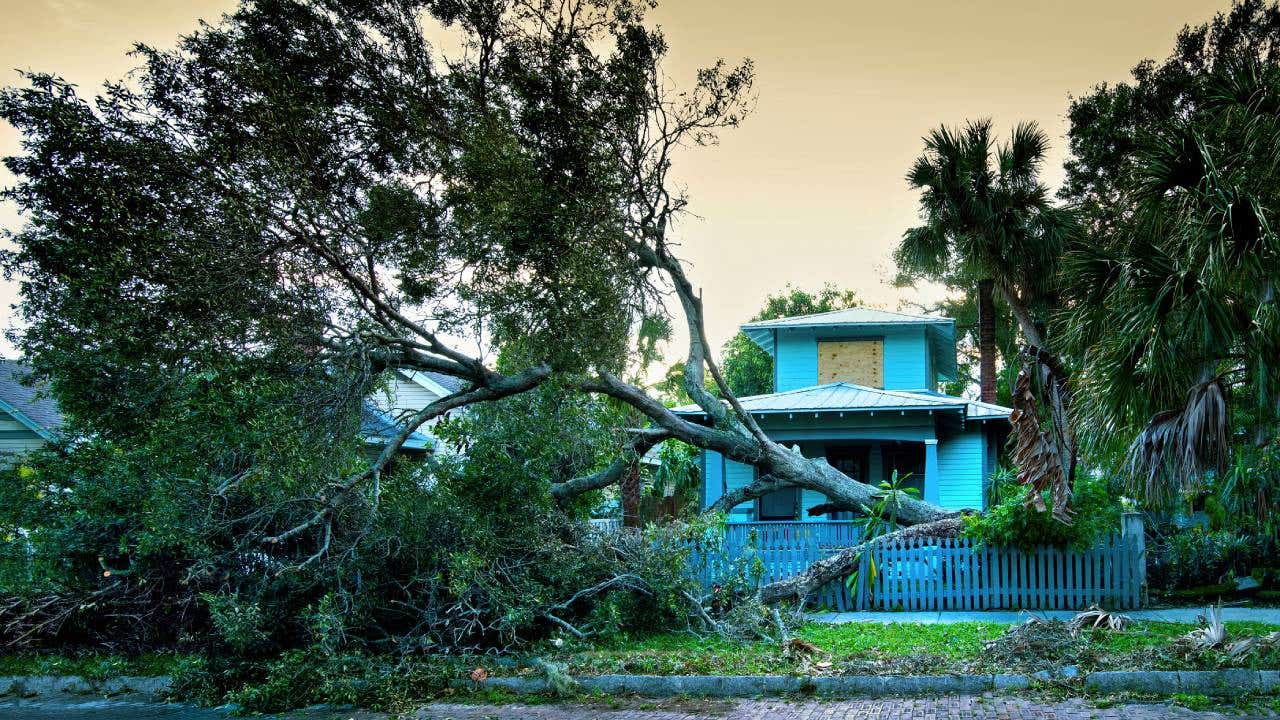“Back to the drawing board”: Florida’s insurance crisis may demand extreme solutions



While the Southeast is still shellshocked from Hurricane Helene and Florida is bracing for Hurricane Milton, Americans nationwide are starting to understand how extreme extreme weather can be.
The National Oceanic and Atmospheric Administration (NOAA) predicted the 2024 Atlantic hurricane season would be historic. With Hurricane Beryl reaching category five status within the first few days of the season, homeowners braced for more — but then there was nothing. The Saharan Air Layer, plumes of dust that annually travel from the Sahara Desert and across the Atlantic, created a pause in tropical cyclone formation.
Hurricane Helene, a Category 4 storm that landed in Florida on September 26, 2024, shattered any hope of a peaceful season. Helene tore through six states, causing biblical damage in North Carolina, where few homeowners have flood insurance. After all, who would expect a hurricane to travel up a mountain?
Hurricane Milton, currently a Category 5 hurricane, will land in Tampa Bay by Wednesday, October 9th, potentially bringing an 8- to 12-foot storm surge. Over the past few years, lawmakers have instituted massive property insurance reforms to turn Florida’s insurance crisis around. While homeowners and legislators hope these changes work, time is one factor they can’t control.
“Everything depends on the rest of this hurricane season, and we are approaching the most dangerous time,” says Florida Representative Spencer Roach when he spoke to Bankrate in August. One of Roach’s main concerns is whether any of Florida’s nine new insurance companies will remain in the state after the next big hurricane. “Right now, everything looks great, and rates have dropped slightly,” says Roach.
But if another storm happens tomorrow in Tampa Bay, which is long, long overdue for a major hit, all of this could go by the wayside. The property market could collapse, and legislators will have to prop these insurance companies back up and go back to the drawing board.— Florida Representative Spencer Roach
In a bipartisan effort to find solutions that aren’t just a wash, rinse and repeat of prior methods, Democratic Representative Hillary Cassel and Republican Representative Spencer Roach co-introduced two bills in February — HB 1213 and HB 1661. While the bills died in subcommittee, both are worthy of discussion, especially with more than 50 days left in hurricane season.
HB 1213: Windstorm Coverage by Citizens Property Insurance Corporation
Insurance operates on the concept of shared risk. By pooling risk together, homeowners and insurance carriers share the burden of financial loss in the event of a catastrophic claim. According to Roach, this is why Citizens Property Insurance shouldn’t be the carrier of last resort.
HB 1213 proposes that Citizens should be the first option for all homeowners and strictly offer windstorm policies instead of writing full HO-3 policies for only the riskiest homes.
On the surface, the plan is simple. If universal windstorm coverage is offered by Citizens, which is run by the state, homeowner’s premiums would be pooled together to pay for future losses, not insurance carrier profits. As its reserves grow over time, the cost of windstorm coverage would decrease. If the program sustained a significant loss before it was profitable, taxpayers would be assessed similarly to the way they are now, and government bailouts would apply directly to the state-backed plan, not to private insurers.
This plan gives homeowners the option to purchase windstorm coverage from Citizens or through a private carrier. It also gives carriers the option to either exclude or offer coverage for wind damage. Either way, Roach theorizes that since hurricane damage — the most unpredictable factor in homeowners insurance — would be off the table, Florida would be a much more attractive and stable market for private insurers.
Insurance policies, deductibles and terminologies vary between states. If you live in a state prone to wind damage, you may have a separate wind deductible along with your standard home insurance deductible. Since each state operates under distinct insurance laws, the deductible for wind damage may be referred to as a hurricane deductible, named storm deductible, windstorm or wind and hail deductible.
Is universal windstorm coverage a viable plan?
Bankrate reached out to Dr. Charles Nyce, Department Chair of Risk Management and Insurance at Florida State University, to see if the concept of universal windstorm coverage had merit. The answer? It’s a bit of a mixed bag.
“If the state of Florida decided to underwrite all of the wind risk through an entity like Citizens,” says Dr. Nyce, “it would address the concern that private insurers do not want to be exposed to wind risk in Florida and by removing that risk, the private market insurers would return to the market and homeowners insurance would be a competitive market again (minus the wind risk and minus flood risk covered by the National Flood Insurance Program).”
However, while this solves the problem of home insurance availability, it doesn’t necessarily ensure that Floridian homeowners will save money. “Homeowners insurance is cheaper,” says Dr. Nyce, “But you still have to purchase wind coverage and flood coverage, which may or may not be cheaper. There is no guarantee that the net cost is going to be lower.”
The time for universal windstorm coverage may have passed
The other problem is time or lack of it. To create a stable insurance market and lower premiums, Citizens needs Florida to be disaster-free for an extended amount of time to build up catastrophic reserves.
Climate change has kicked extreme weather into high gear, causing hurricanes to develop at record speed and occur in fairly close time periods. In 2020, Louisiana experienced four significant hurricanes within 12 months, Hurricanes Laura, Delta and Zeta in 2020 and Hurricane Ida in 2021. Florida has had six hurricanes since 2020. If we count impending Hurricane Milton, that would make the third hurricane within three months.
Don Crane, a former Florida state representative, created a plan very similar to Roach and Cassel’s back in 2006. Crane, along with a small coalition, discovered a state-funded windstorm plan could build a $82 billion surplus if Florida could avoid catastrophic storms for 10 years. His proposal didn’t gain any traction, but ironically, Florida managed to avoid a direct hit from a hurricane from 2007 to 2017.
“It would have worked out well if they had decided to do this in 2006 or 2007 and then went 10 years without a storm occurring,” says Dr. Nyce. “It would not have worked out so well if they had done this when Citizens formed in 2002. Insured losses in 2004/2005 approached $35 billion. The State of Florida would have been on the hook for those losses. Can you imagine the assessments Citizens would have had to do in that scenario?”
Florida state law requires Citizens to levy an assessment on policyholders if it experiences a deficit as a way to replenish funds for future claims. There are two kinds of assessments: the Citizens Policyholder Surcharge and the Emergency Assessment. The Citizens Policyholder Surcharge can cost up to 15% and is paid in addition to the Citizens policy premium. The Emergency Assessment kicks in if the surcharge doesn’t fully cover the deficit. This assessment can cost up to 10% of your policy premium and applies to all insurance policies in the state, including auto, boat and renters insurance, not just Citizen policyholders.
HB 1661: Property Insurer Financial Strength Ratings
Another bill Roach and Cassel co-introduced was HB 1661, which addresses insurance company financial stability ratings from third-party rating organizations. Financial analysis firms review insurance companies’ financial health and provide a financial stability rating (FSR) to reflect the carrier’s creditworthiness and economic resilience. While this score can be a helpful tool for homeowners to understand if their insurance company is financially stable, it is crucial for homeowners with a mortgage.
Government-sponsored enterprises (GSE) like Fannie Mae and Freddie Mac require homeowners to maintain home insurance with companies that meet certain rating requirements. A good FSR indicates that an insurer can honor policyholder claims and remain solvent, or at least it should. Roach found out that this is not always the case when his insurance company, UPC, which had an A- Excellent FSR from Demotech, went insolvent after Hurricane Ian.
“What we have seen decade over decade, is that these companies come into Florida and they are vastly under-capitalized,” says Roach. “They collect money from policyholders and then when a big storm hits, they go into receivership, leave the state and say good luck, we can’t pay your claim.”
HB 1661 would require insurance companies to receive an FSR from independent rating agencies and redefine what qualifies as an independent agency versus a private agency. Some of the requirements cited from the bill require an independent rating agency to:
- Issue FSR based on an objective analysis
- Issuer ratings without the consent of the insurer
- Not receive any payment of any kind from the insurer
- Not allow the insurer to influence the rating
Roach feels that using only FSRs that insurance companies pay for may influence the results and put Florida homeowners in a dangerous financial position.
Would alternative independent rating agencies create meaningful change in the Florida home insurance market?
It is easy to understand why having more independent rating agencies would resonate with homeowners. In life, which product reviews do you trust more, sponsored or truly independent ones? But when it comes to financial products, the stakes are higher and the process is much more complex.
The U.S. Securities and Exchange Commission (SEC) regulates credit rating agencies registered as Nationally Recognized Statistical Rating Organizations (NRSROs). Some stipulations of NRSRO-registered agencies include making certain information available to the public, maintaining certain records for three years and disclosing any conflicts of interest to the SEC. Recently, the SEC fined six rating agencies a combined $49 million dollars for failing to keep electronic communications.
Bankrate reached out to Demotech and KBRA, both NRSRO agencies, and Weiss Rating, which meets the HB 1661 definition of a more independent rating agency, to get their views on this topic.
Demotech
“Demotech’s procedure from 1989 to date is that we review catastrophe reinsurance treaties, catastrophe modeling output, establish minimum catastrophe reinsurance program minimums, review catastrophe response programs as well as disaster recovery plans and interact with management,” says Joe Petrelli, CEO and founder of Demotech. “Agencies that do not interact with companies or secure copies or analyses of catastrophe reinsurance programs have no idea how much claims-paying capacity a carrier has purchased from publicly traded, international reinsurers who specialize in catastrophe reinsurance.”
KBRA (Kroll Bond Rating Agency)
“While I suppose there could be some marginal benefit of requiring unsolicited ratings across the entire Florida market, I don’t think such a mandate would be terribly impactful because of the inherent analytical limitations of unsolicited ratings,” says Peter Giacone, Senior Managing Director of KBRA and head of the Insurance Ratings group.
“While it’s a start, a complete assessment of the financial strength of an insurance company requires more than reviewing a quarterly financial statement or other narrow public disclosures which by their very nature are lagging indicators,” Giacone says. “KBRA believes that a financial strength rating must be forward-looking and therefore should incorporate key qualitative considerations of the insurance company such as risk management and governance frameworks, business strategy and forecasts, and financial flexibility to name a few… none of which can be accurately evaluated without engagement with the company and its management team/owners.”
Weiss Ratings
“Weiss has never accepted, and never will accept, compensation in any form from the companies it rates for issuing its ratings,” says Dr. Martin Weiss, Founder of Weiss Ratings and Chairman of the Board. “Nor does it accept ads from any companies on its site. The only business model that can assure continuing objectivity and accuracy is one that’s based on complete independence — not just for revenues, but also for data. “
“The Florida property insurance market is already in a state of collapse even before any new catastrophic events,” says Dr. Weiss. “Probably the most consistent catastrophe has been man-made — in the form of legislation that has severely distorted the market and conflicted ratings that have painted lipstick on a pig as the norm.”
Florida’s insurance crisis needs a holistic solution
Florida’s home insurance recovery efforts have made some positive impacts for homeowners. Several new insurance companies have entered the market and insurance premiums have decreased slightly. However, the average cost of Florida home insurance is still drastically higher than most other states, with an annual premium of $5,531 for $300,000 in dwelling coverage.
Rate stabilization is important for homeowners, but not if the rate is at an unattainable level. “Increased competition will reduce rates,” says Dr. Nyce, “but we are not likely ever returning to rates from the 2015/2016 era.”
There are three reasons why rates have increased in the last few years: exposure growth, inflation and climate change. Inflation has slowed, storm activity has not, and exposure growth has not. So, I don’t think we are going to see significant rate decreases, but certain areas will, especially lower-risk areas.— Dr. Charles Nyce, Department Chair of Risk Management and Insurance at Florida State University
According to Nyce, the only way to substantially reduce premiums is to reduce potential losses and the cost of capital supporting the risk. But this is not something that can be done by just focusing on insurance companies. The solution needs to encompass every person and entity involved in homeownership.
“We need to develop a strong mitigation program to reduce current and future losses by hardening existing building stock in a meaningful way,” says Nyce. “This needs to incorporate not just property owners and the State of Florida, but insurers, builders, mortgage lenders and other government entities. There are lots of moving parts to this type of solution, but it is most likely to be successful in addressing future catastrophe risk, not just in Florida but in wildfire areas, tornado areas, severe convective storms and all the other disasters.”
Why we ask for feedback Your feedback helps us improve our content and services. It takes less than a minute to complete.
Your responses are anonymous and will only be used for improving our website.




